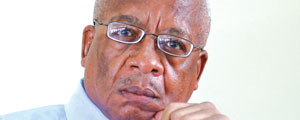
Corruption in Zimbabwe has gone mad. The tangled web of lies, deceit and monumental fraud is unravelling.
Echoes by Conway Tutani
The true nature of those in power is beginning to emerge with each new revelation of high-level corruption. People are beginning to realise that whites are not necessarily their worst enemies; that whites have been cynically used to divert attention from those hellbent on abusing their positions for obscene self-enrichment at ruinous expense to the nation; that colonial exploitation is child’s play compared to what they are being subjected to today at the hands of fellow blacks.
“Minorities make for great scapegoats in all walks of life. If we can just place the blame on this small group of people, then it means there’s nothing really wrong with the rest of us,” writes blogger “David”.
Those who had allowed their political persuasion to cloud their objectivity now realise that corruption is inherent in mankind; that it knows no racial or ideological bounds. It’s about human greed found from China to Chile, from Norway to Namibia.
Immediate past Zambian President Rupiah Banda was in court this week over his alleged involvement in a corrupt oil deal when he was in office.
Again this week, Nigerian President Goodluck Jonathan sacked four ministers, the most high-profile being Aviation minister Stella Oduah. She had been embroiled in allegations of corruption after her ministry spent $1,5 million on two bulletproof luxury cars. But Jonathan still took drastic action despite Oduah being his close ally. He is trying to reset the Nigerian psyche where corruption had become the norm. That would be a big ask in Zimbabwe, wouldn’t it?
But what happens when a nation doesn’t learn from its past mistakes? Corruption becomes rampant. You get corrupt leaders and their merry bands of cronies and hangers-on – nothing but thieves through and through, common criminals.
- Chamisa under fire over US$120K donation
- Mavhunga puts DeMbare into Chibuku quarterfinals
- Pension funds bet on Cabora Bassa oilfields
- Councils defy govt fire tender directive
Keep Reading
The entire system becomes compromised – such as in Zimbabwe where this has been the case for decades with condonation and denial the name of the game. The system has created State-protected monopolies and the consequence has been massive inefficiencies and grand corruption. Not to mention a whole industry of political party-run – instead of government-run — farming and other input schemes which have become a corrupt network of cronyism and patronage feeding from the taxpayer year in, year out.
Those at the right place at the right time – that is, chancers and opportunists — cannot help, but dip into these schemes and rackets they create from these.
It’s too tempting because it’s so easy to get away with it. If there are no strict checks and controls, people will naturally exploit the loopholes. That is why some yobos are currently going around schools in Mashonaland East demanding $2 each from teachers purportedly for funding President Robert Mugabe’s birthday bash, extorting money by threat of violence. Since when have donations been compulsory? The day of reckoning will surely come.
When then Chronicle editor Geoff Nyarota broke the Willowgate Scandal involving the corrupt resale of vehicles at highly-inflated prices by Cabinet ministers during a time of shortage in 1988, he was labelled “overzealous” by you-know-who. Twenty-six years later, corruption has not disappeared; it has grown to shocking proportions.
But scapegoating of the media from high offices continues. Last week, Vice-President Joice Mujuru attacked the media for merely doing its duty as a watchdog by naming and shaming corrupt politicians and company executives, notwithstanding her lame denial of this a few days later.
She said the media must stop reporting on corruption because it’s being used by people who are after destroying the ruling Zanu PF party from within.
Well, this should be our least worry because it doesn’t alter the fact that rampant corruption is bleeding the nation.
If they fight among themselves, so be it. If the party implodes in the process, it’s their business, not ours. If factionalism smokes out the corrupt, this will have an unintended, but positive consequence on the nation.
What should concern us is the bigger picture of corruption – not the real or imagined threat to the existence of a political party. This a serious and urgent matter.
Many crimes have been discovered because of a fallout among accomplices. To further illustrate this, some years ago a battered, bruised, sobbing woman walked straight into the police station and told the officers on duty that her husband had a whole sack of mbanje (marijuana) in the wardrobe. The man was jailed despite the regretful wife’s pleas later to have the charges dropped because she and her children would lose a breadwinner. It was now the State versus her husband.
In the 1980s, a vengeful, ditched mistress walked straight into the police station and poured out to officers that she and her married lover, who was a sectional manager at the largest insurance firm in this country, had jointly committed insurance fraud by taking out a life policy in her husband’s name without his knowledge and then forging his death certificate while he was still alive, following which they got a lump sum payout of $58 000.
The man was jailed for 12 years and the woman, to her shock, got 8 years. The matter was now in State hands. That was the unintended consequences of bringing attention upon herself.
So, when top politicians and company executives live corruptly and ostentatiously, acquiring big, fancy houses, collecting wives and “small houses” (mistresses) as trophies – in fact, the whole bang shoot of greed and decadence – they mustn’t blame the media for bringing negative attention upon them. They will have made themselves political flashpoints.
Forward with factionalism!











